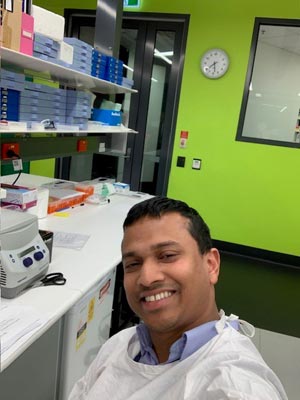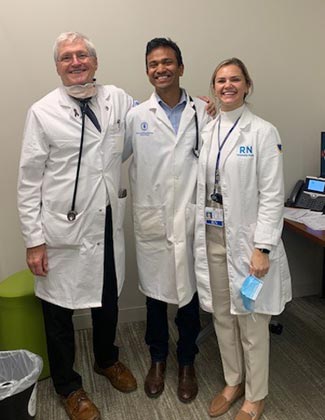Game-changing treatment in battling cancer

Dr. Dilanka De Silva at the Peter MacCallum Cancer Centre laboratory in Melbourne, Australia
The word is dreaded – ‘cancer’ sends chills down the spine of all and sundry, along with a sense of utter hopelessness.
But it was a patient with Stage 4 (final stage) lung cancer that he saw in the United States of America (USA) while on a Clinical and Research Fellowship at the Memorial Sloan Kettering Cancer Center, New York, in thoracic oncology in 2020-2021 that got Dr. Dilanka De Silva onto the pathway that he is following passionately now.
Currently, he is working as an Honorary Consultant Medical Oncologist at the Royal Melbourne Hospital and Peter MacCallum Cancer Centre Victoria in Australia.
“The cancer in this patient had spread to his brain. However, he lived six years not because of chemotherapy treatment but precision or targeted treatment which was just a tablet,” he says, with his words still tinged with wonder.
Then there was another patient in Australia who had Stage 4 colon cancer, diagnosed in 2002 and alive in 2013. The cancer had spread to the liver and he had undergone a liver-resection (the surgical removal of a part of the liver). By 2010, the cancer had gone to the lung and a targeted lung resection had been performed.
“I am seeing him in 2013 with no evidence of cancer. I never thought that it was possible. This motivates people and I am in a field which is really leaping forward,” says Dr. De Silva with conviction, providing hope to many.
His message is loud and clear: Many treatment options are available, even for terminal cancer, and patients should not lose hope. “If you don’t try, you will not know it.”
He goes onto explain that for a low-resourced country such as Sri Lanka, clinical trials should be the first option if available, as it has been proven/published that patients who get enrolled in clinical trials live longer and lead a better quality of life.
“If we establish a proper trial centre in Sri Lanka, patients will have better drug access for nominal costs,” says Dr. De Silva, reiterating that he is “eager” to collaborate with oncologists/other specialists in Sri Lanka who do a highly commendable job in a restricted resource setting.

Dr. Dilanka De Silva with colleagues at New York’s Memorial Sloan Kettering Cancer Center
Moving onto “targeted therapies” which are a game-changer, he says that they work better – higher efficacy and response rates: more than double the rates of conventional chemotherapy – with significantly fewer side-effects. He takes up lung cancer as an example and says they would mark the area, look at it under a microscope and extract the DNA from that cancer. Thereafter, the DNA sample would be purified and the DNA multiplied which would provide invaluable information on exactly what is driving the cancer. The treatment would then be evidence-based and more targeted.
“The difference between the 20th and the 21st centuries is that chemotherapy does not come onto the main stage. It is the last option as there is more targeted treatment. It is only in the absence of a targeted treatment that we go for chemotherapy,” he says, pointing out that even chemotherapy has come a long way. There is an armoury of drugs to battle the side-effects of chemotherapy such as vomiting and diarrhoea which allow a higher chance of chemotherapy compliance by patients.
Referring to many technologies that are in the development pipeline, he says a simple blood test (liquid biopsies) can diagnose cancer and monitor the response to treatment. These avoid invasive procedures and the complications associated with them. Usually Australia and the US are better destinations for cutting edge technologies than Singapore.
Raring to share his expertise and experience with Sri Lanka, 42-year-old Dr. De Silva who was in the country recently has his roots firmly embedded here. Having studied at D.S. Senanayake College and then Ananda College, Colombo, he had secured his MBBS from the Faculty of Medicine, University of Colombo, joining the National Hospital of Sri Lanka (NHSL) as an intern.
It had been in 2017 that he became a Member of the Royal College of Physicians (RCP) United Kingdom (London); in 2019 secured the Fellowship of the Royal Australasian College of Physicians (Medical Oncology); in 2020 become a PhD candidate with the University of Melbourne on ‘Guide Precision Medicine in Breast and Thoracic Oncology’; in 2021 a Member of the RCP (Medical Oncology); and 2021 completed all steps of the United States Medical Licensing Examination (USMLE) securing licensing in the State of New York.
When we ask him for photographs of him engaging in work with regard to cancer, he smilingly says that he has “not had enough time to smell the roses” and with difficulty digs up a few.
While pointing out that dedication to work would not be possible without the wholehearted support of his wife, Dr. Dinushi Weerasinghe, a Neurologist in Melbourne, he says that others who made the journey easier are his parents Dr. Dayan and Lakshmi De Silva and his mother-in-law Dr. Benita Weerasinghe.
| Benefits of BRCA genes test | |
| If you are younger and have breast cancer, you should consider getting genetic testing done for the BRCA genes – is the fervent plea of Dr. Dilanka De Silva.Famous actress Angelina Jolie has these genes and it is good to be armed with this knowledge, he says, taking a close look at the BRCA genes (BRCA1 – BReast CAncer gene 1) and (BRCA2 – BReast CAncer gene 2). “People with these genes are prone to getting cancer at a younger age – more aggressive, multiple cancers. Women with these genes would be more vulnerable to ovarian and pancreatic cancers and men to prostate cancer. If known early, cancers are preventable and treatable,” he says, adding that if a parent has these genes, the probability of the children inheriting them is 50%, while the lack of family history could be deceptive. To add weight to his plea, Dr. De Silva backs up his cautioning with data. Usually, the risk of breast cancer in a population is 1:8 (about 12.5%). However, if a person has the BRCA1 gene, this risk rises “massively” to around 70%. If a person has the BRCA2 gene, the usual risk of 12.5% shoots up to 62.5%.
|
Searching for an ideal partner? Find your soul mate on Hitad.lk, Sri Lanka's favourite marriage proposals page. With Hitad.lk matrimonial advertisements you have access to thousands of ads from potential suitors who are looking for someone just like you.


